Fruit is healthy, children should eat fruit, everyone should include five portions of fruit in their daily intake, you've heard it all before. This I bear in mind whenever I go shopping, and I try to buy all the variety and quality that my purse can afford. In this day and age, though, where all innocence is lost concerning the safety of our food due to diseases, climate change and pesticide use, fruit is just not what it used to be. Apart from these basic issues, there's also the philosophical question of choosing local vs. imported and organically vs. conventionally grown. We are often faced with the dilemma of buying local or organic produce, as opposed to food that has travelled long distances or been grown by conventional means. But how often is it possible to buy something that is BOTH local AND organic? Local food does not entail that what you eat will be organic; it simply has to do with where the food was produced or grown. More than likely, it will have been grown conventionally for cost-efficiency purposes.

These bananas will have to be made into banana cake muffins; no one will touch them when their skins start to turn splotchy. We recently indulged in some gourmet apple varieties - the locally grown ones were gifts, while the others are all grown somewhere in Central and Northern Greece. Click on the photo to see the notes.
So here I am at the fresh produce counter. It makes little difference whether I am in the supermarket or a greengrocer's when it comes to bananas; the same stuff is being sold at both places at roughly the same price. I always buy one bunch of bananas on a weekly basis - they only go into the kids' lunchboxes. Bananas are easy to peel at school and you can eat them without getting your hands dirty. An apple could do the same job, you say. Sure, as long as the juices don't run down your hand and onto your sleeves. But that's not the real problem; it's the peel. Remember the days when we simply washed an apple and ate it without peeling it? In Crete, that's a definite no-no. Do it in public and watch the stares. Locals peel them out of fear of pesticide use.
Local/Organic: Although bananas are locally grown, they are not widely available. The local bananas are very small and only specialist greengrocers sell them. They taste good, but it's not easy to access them on a regular basis. Imported Chiquita/Dole bananas (among other brand names) are sold all over Greece; despite having travelled hundreds of miles to get to my home, they taste good and are a reasonably priced fruit. To be sure that the kids don't bin the bananas at school during their morning break (a mother never really knows what her kids get up to at school, no matter how much she insists that she can trust them), I have to make sure that the bananas I buy 'look' perfect, which is why I always buy them when the peel is grass green. They seem to turn yellow and soften the minute you pick them up. By the time you get them home, they have already started changing colour, and within two days, they are canary yellow. And they don't stop there, do they? Their skin slowly develops brown-black spots, a sign that the banana is starting to over-ripen. Children are put off easily by the blackened exterior of the banana peel, even though the fruit itself may have remained unblemished and tasty, which often happens with bananas.
As for their organic status, only two or three years ago, when the organic label was being pushed onto consumers, organic Dole bananas suddenly appeared side-by-side with their non-organic counterparts. They were priced slightly higher (only natural). After a few months, they disappeared. Why? They went bad too quickly. Dilemma solved: buy green imported conventionally-grown bananas.
Next up, apples. They always look firm and unblemished on the shelves, but no one really knows what they taste like, or what they look like inside. Crete is not an apple producer (apple tree owners at high altitudes usually grow them for their own use), so nearly all the apples on the Cretan market are imported from the mainland or from abroad. As they travel, they are stored in refrigerators, then put on the shelf. The change in temperature causes the fruit to turn brown and lose its flavour - but the skin may stay unblemished. Either that, or they are not ripe when harvested, and may need to be ripened at room temperature before eating. You never really know what a store- bought apple in Hania will be like until you take a bite. Having said that, the best time to enjoy apples is now since we are in the middle of the apple season.
Local/Organic: Very few local apples are available on the market, for the reasons explained above. Gourmet apple varieties are now being grown in Northern Greece; click on the first photo above to see the different varieties we tried recently. The organic label can be found for apples - but they not locally grown: they all come from abroad.
During my recent fruit-shopping trip, I added another political dimension to my spending policy by buying some of the last of this season's fresh peaches, in order to support the Northern Greek peach and nectarine farmers who claim they aren't getting a fair deal from government subsidies, taking to the streets and binning their fruit in public squares around the country. A recent national television advertising campaign tried to bring home the message that peaches are good for you, and a canned peach is just as healthy as a fresh one. Peaches are an extremely sensitive fruit: they have a low shelf-life and are highly susceptible to fruit diseases due to moisture content. The fruits on display looked firm and inviting (if a little on the over-furry side), but their interior was brown and spoiled. They tasted like paper.
Local/Organic: Peaches are grown in Northern Greece, with similar storage and transport problems as apples. They are very sensitive fruits. I have never seen organic peaches, and I doubt they keep well, which is why they probably do not sell well in Hania.
The kiwifruit took my fancy because of my bias for buying New Zealand products whenever I can, simply for their nostalgic novelty value. Kiwifruit stores very well. It ripens slowly, even off the vine, making it suitable to be able to be harvested early and exported. The kiwifruit I bought was perfect in appearance and taste.
Local/Organic: Kiwifruit is grown in Crete and Northern Greece, but not organically. New Zealand produces organically grown kiwifruit, but it's not available in Greece.

These bananas will have to be made into banana cake muffins; no one will touch them when their skins start to turn splotchy. We recently indulged in some gourmet apple varieties - the locally grown ones were gifts, while the others are all grown somewhere in Central and Northern Greece. Click on the photo to see the notes.
So here I am at the fresh produce counter. It makes little difference whether I am in the supermarket or a greengrocer's when it comes to bananas; the same stuff is being sold at both places at roughly the same price. I always buy one bunch of bananas on a weekly basis - they only go into the kids' lunchboxes. Bananas are easy to peel at school and you can eat them without getting your hands dirty. An apple could do the same job, you say. Sure, as long as the juices don't run down your hand and onto your sleeves. But that's not the real problem; it's the peel. Remember the days when we simply washed an apple and ate it without peeling it? In Crete, that's a definite no-no. Do it in public and watch the stares. Locals peel them out of fear of pesticide use.
Local/Organic: Although bananas are locally grown, they are not widely available. The local bananas are very small and only specialist greengrocers sell them. They taste good, but it's not easy to access them on a regular basis. Imported Chiquita/Dole bananas (among other brand names) are sold all over Greece; despite having travelled hundreds of miles to get to my home, they taste good and are a reasonably priced fruit. To be sure that the kids don't bin the bananas at school during their morning break (a mother never really knows what her kids get up to at school, no matter how much she insists that she can trust them), I have to make sure that the bananas I buy 'look' perfect, which is why I always buy them when the peel is grass green. They seem to turn yellow and soften the minute you pick them up. By the time you get them home, they have already started changing colour, and within two days, they are canary yellow. And they don't stop there, do they? Their skin slowly develops brown-black spots, a sign that the banana is starting to over-ripen. Children are put off easily by the blackened exterior of the banana peel, even though the fruit itself may have remained unblemished and tasty, which often happens with bananas.
As for their organic status, only two or three years ago, when the organic label was being pushed onto consumers, organic Dole bananas suddenly appeared side-by-side with their non-organic counterparts. They were priced slightly higher (only natural). After a few months, they disappeared. Why? They went bad too quickly. Dilemma solved: buy green imported conventionally-grown bananas.
Next up, apples. They always look firm and unblemished on the shelves, but no one really knows what they taste like, or what they look like inside. Crete is not an apple producer (apple tree owners at high altitudes usually grow them for their own use), so nearly all the apples on the Cretan market are imported from the mainland or from abroad. As they travel, they are stored in refrigerators, then put on the shelf. The change in temperature causes the fruit to turn brown and lose its flavour - but the skin may stay unblemished. Either that, or they are not ripe when harvested, and may need to be ripened at room temperature before eating. You never really know what a store- bought apple in Hania will be like until you take a bite. Having said that, the best time to enjoy apples is now since we are in the middle of the apple season.
Left: an apple orchard in northern Greece; right: an apple tree in Therisso, Crete, fenced off by its owner to keep away passersby
Local/Organic: Very few local apples are available on the market, for the reasons explained above. Gourmet apple varieties are now being grown in Northern Greece; click on the first photo above to see the different varieties we tried recently. The organic label can be found for apples - but they not locally grown: they all come from abroad.
This fruit was freshly peeled and sliced; on closer inspection (enlarge the photo for detail): the apple wasn't ripe (it was too sour); even though the peach was firm, the fruit was ruined by over-browning. The kiwifruit was perfect but it had travelled well over 24 flight hours to get to my house, and so was the locally-grown seasonal pomegranate.
During my recent fruit-shopping trip, I added another political dimension to my spending policy by buying some of the last of this season's fresh peaches, in order to support the Northern Greek peach and nectarine farmers who claim they aren't getting a fair deal from government subsidies, taking to the streets and binning their fruit in public squares around the country. A recent national television advertising campaign tried to bring home the message that peaches are good for you, and a canned peach is just as healthy as a fresh one. Peaches are an extremely sensitive fruit: they have a low shelf-life and are highly susceptible to fruit diseases due to moisture content. The fruits on display looked firm and inviting (if a little on the over-furry side), but their interior was brown and spoiled. They tasted like paper.
Local/Organic: Peaches are grown in Northern Greece, with similar storage and transport problems as apples. They are very sensitive fruits. I have never seen organic peaches, and I doubt they keep well, which is why they probably do not sell well in Hania.
The kiwifruit took my fancy because of my bias for buying New Zealand products whenever I can, simply for their nostalgic novelty value. Kiwifruit stores very well. It ripens slowly, even off the vine, making it suitable to be able to be harvested early and exported. The kiwifruit I bought was perfect in appearance and taste.
Local/Organic: Kiwifruit is grown in Crete and Northern Greece, but not organically. New Zealand produces organically grown kiwifruit, but it's not available in Greece.
Finally, the pomegranate season has arrived. I bought some of the first to arrive in the shops; it is one of my favorite autumn fruits and can be added to both sweet and savoury dishes. Imported pomegranate can be found in Greece all year round, of the crimson red variety, grown in India. But they aren't as tasty as the local variety, which has a yellow outer skin and pink seeds. They grow literally everywhere in Hania.
Local/Organic: A lot of people in Hania have a pomegranate tree growing in their garden at home. Their fruit is highly decorative, and reminiscent of Christmas and the New Year: the pomegranate symbolises the cold season, when Persephone leaves her mother Demeter and joins her cold dark husband Hades in the underworld. Most of the time, these fruit trees are organic de facto, rather than anything to do with the way they are cared for in the field. They are a safe bet when your aim is to buy local, seasonal, organic produce in Crete.
The seedless grapes that are available in the stores at the moment are also brilliant. The grape season did not go well in our case this year (last year was a bumper crop). Both the red and green varieties that I bought were both excellent in taste and appearance.
Maybe next year will be a good one for our grapevines (these photos are last year's harvest); this year, ours (and those of our friends and relatives) did not do well for some reason. Some people blame it on the weather, others on swine flu...
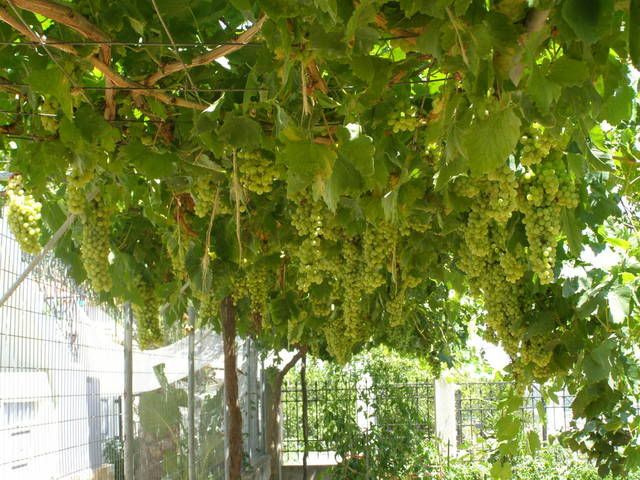

Local/Organic: Iraklio, an eastern prefecture of Crete, has a high profile in quality grape cultivation, both for the table and wine-making. They have never been sold under an organic label in the supermarket, as they are also very sensitive cultivations, judging by what happened to our crop this year.
*** *** ***
There is a lot of emphasis placed on people these days to buy organic/local food products, but it's rare to see these two factors combined. Most organic food has made greater mileage than one would even consider doing when they go on holiday. In our house, you will probably find more local food available than organic products, simply because they taste better. Fruit and vegetables grown in Crete have a superlative taste than their foreign-grown counterparts, something to do with the climate and soil, among other factors. Come and taste them for yourself.
©All Rights Reserved/Organically cooked. No part of this blog may be reproduced and/or copied by any means without prior consent from Maria Verivaki.
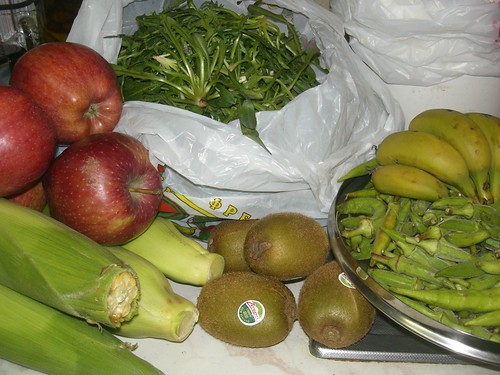
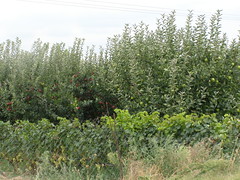
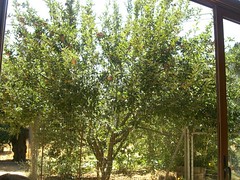

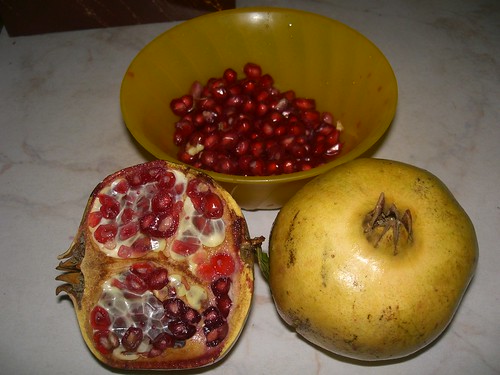


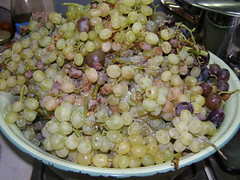
This is a very nice post. I was going to write about the challenge of making local/organic purchases myself. Obviously the best would be local and organic but it just isn't possible a lot of the time. I think that I would chose local over organic lots of times because the organic things can sometimes be from too far away and the local stuff is usually going to be a bit fresher.
ReplyDeleteWhat dilemmas we mothers face!
Bananas are still my favourite, and berries when in season. Living in a wine and fruit producing area we are luckier than most to have perfectly ripe fruit available but still at a premium cost and only in season.
ReplyDeleteI buy local hands down instead of organic. If one can combine both fine, otherwise it is not worth it. I used to love Cretan bananas, they were so tasty, but they are very hard to find these days.
ReplyDeleteIn Canada, only kids demand peeled apples - it's something they're supposed to "get over", like wanting the crusts cut off their sandwiches. I prefer a cut-up apple though because I find it easier to eat - it's faster and I get less peel in my teeth!
ReplyDeleteApples are about the only local fruit you get here, except berries, and things like pumpkins. The nearest fruit-growing area (peaches and pears especially) is in southern Ontario...and even there sometimes I found it hard to find local produce on the shelves...everything in our grocery stores seems to come from the US or South America...even the garlic comes from China!
garlic from china is very common here too - demand outstrips supply. locally grown garlic is hard to find, but you can find garlic grown in thraki (thrace) - it's a little more expensive than chinese garlic, but when supplies of that run out, we'll have to start buying chinese garlic
ReplyDeleteI buy green bananas too! My kids won't touch them with even so much as on freckle on them. I won't either though.
ReplyDeleteI try to buy local too but it's difficult.
As far as organic, we're trying to grow our fruit with little or no pesticides and this year the birds & bugs enjoyed almost everything. Unfortunately if I want to enjoy more than 20 apples from our 6 apple trees...we have to spray.:(
BTW...did you know we have kiwis here too? Last yr I got a mind-blowing crop of 8!!
But, we love kiwis and I always have them in the fruit basket. Kiwis are wonderful!! ;)
Nice post - fruits photos ..Keep Posting
ReplyDeleteRon
fruits photos
wow, great post!
ReplyDeleteWe get all of the fruits you mention, over here, but somehow, they taste a little bit stale...Sometimes they are alright, but others it's like a "typical" fruit...it tastes..."Typical"...While fruits we are used to have more "substance"
"nostalgic novelty value"
...not only in fruits :-D :-D
I and I think I speak for most Greeks, will eat fruit after a dinner...our dessert if you will. I enjoy desserts but fresh & seasonal fruit - can't be beat!
ReplyDeleteYou have to try one of grapefruit-sized peaches from Naoussa & Giannitsa areas...delish!
At least you don't live in Alaska - the land of flying fruit!
ReplyDelete